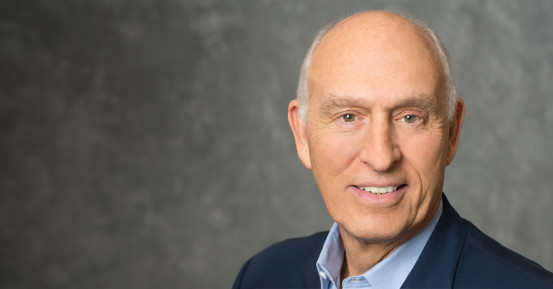A Time for Change Now: Dr. Bernice A. King’s Message of Love at UC San Diego’s Helen Edison Lecture Series
UC San Diego’s Office of the Vice Chancellor for Equity, Diversity, and Inclusion Joined Forces with the Division of Extended Studies to Present a Memorable Evening on May 17, 2024
Story by:
Media contact:
Published Date
Story by:
Media contact:
Share This:
Article Content
What can we do to restore our communities through the lens of the heart? What tools will help us be intentional about preparing powerful and socially conscious students? How do we reimagine education on our campus now?
On the evening of Friday, May 17, more than 400 guests from UC San Diego and the local community gathered at the Jeannie Auditorium in the North Torrey Pines Living Learning Neighborhood on the UC San Diego campus to hear Dr. Bernice A. King ponder these questions as she reflected on the legacy of her parents, Martin Luther King Jr. and Coretta Scott King.
Dr. King’s appearance was presented through a collaboration with the Helen Edison Lecture Series within the Division of Extended Studies and the EDI Lecture Series, housed in the Office for Equity, Diversity, and Inclusion (EDI). This partnership was essential to bringing Dr. King to UC San Diego, through the Office for EDI’s influence, and extending the impact of her appearance throughout campus and into the community.
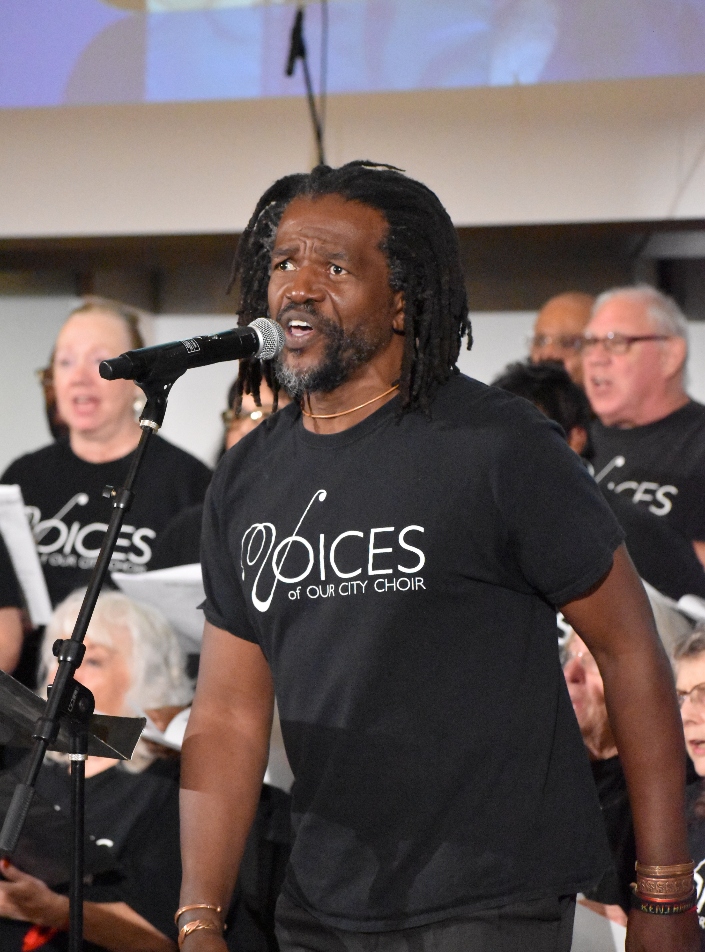
Among the attendees were leadership from UC San Diego and the Division of Extended Studies, including Elizabeth H. Simmons, Executive Vice Chancellor; Becky R. Petitt, Vice Chancellor for Equity, Diversity and Inclusion; Alison Sanders, Assistant Vice Chancellor for Academic Affairs; Hugo O. Villar, Dean of Extended Studies; Cheryl A.M. Anderson, Professor and Dean of the Herbert Wertheim School of Public Health and Human Longevity Science; Helen V. Griffith, Superintendent of the Preuss School at UC San Diego; Randy Brooks, Associate Dean for Business Affairs, Herbert Wertheim School of Public Health and Human Longevity Science; and Andrew Waltz, Director of Arts Management for Extended Studies.
The event kicked off with an inspiring performance by San Diego-based Voices of Our City Choir, amplifying the stories and voices of people impacted by homelessness through music and arts. The nationally recognized choir serenaded the audience with several uplifting numbers, including their original, award-winning song, “Sounds of the Sidewalk.”
Introductory remarks to the program included an overview from UC San Diego Extended Studies Dean Hugo Villar, who reflected on the importance and relevance of the Helen Edison Lecture Series in fulfilling the Division's mission.
“Tonight, we’re particularly excited to join forces with the Office for Equity, Diversity, and Inclusion to bring you a very special guest [who] embodies the principles of the Helen Edison Lecture Series, because of her work to advance humanitarian purposes and objectives: the Reverend Bernice King.”
Vice Chancellor Becky Petitt introduced the program and Dr. King, underscoring the Office for Equity, Diversity, and Inclusion’s role in facilitating this remarkable opportunity at UC San Diego at this critical moment.
“We were deliberating about which speaker we should bring. Who can help us shed light and the love we so desperately need in this moment?” she said. “We determined that Dr. Bernice King would be the perfect speaker. We are looking forward to hearing her words of wisdom and encouragement.”
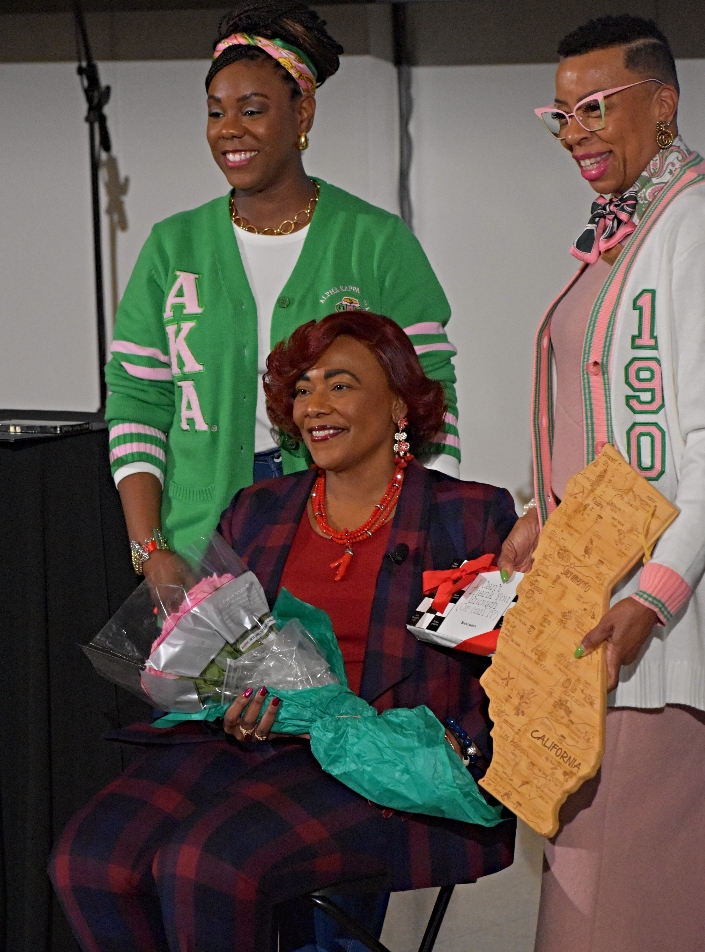
Before the program conversation commenced, there was a special surprise presentation from local Alpha Kappa Alpha sorority members, including campus leaders Dean Cheryl Anderson and Executive Director Helen Griffith. An international service organization, Alpha Kappa Alpha is the oldest Greek-letter organization established by African American college-educated women and one of the National Pan-Hellenic Council, also called the “Divine Nine.” Bedecked in the official colors of salmon pink and apple green, the Alpha Kappa Alpha sisters presented Dr. King with gifts and took a group photo.
The showcase of the night was a moderated conversation with Dean Anderson and Dr. King. Vice Chancellor Petitt introduced them with a moving story.
“Just last month, Dean Anderson led a small group on a six day trip to particular sites in the southern United States to explore the impact of racial and other injustices on higher education and public health,” shared Vice Chancellor Petitt. “The experience was facilitated by Reverend Dr. Christopher Carter. We had the opportunity to meet Bryan Stevenson, founder of Equal Justice Initiative of West Montgomery [Alabama], and our trip concluded with a visit to the King Center. This is a full-circle moment for us. I thank Dean Anderson for her visionary leadership.”
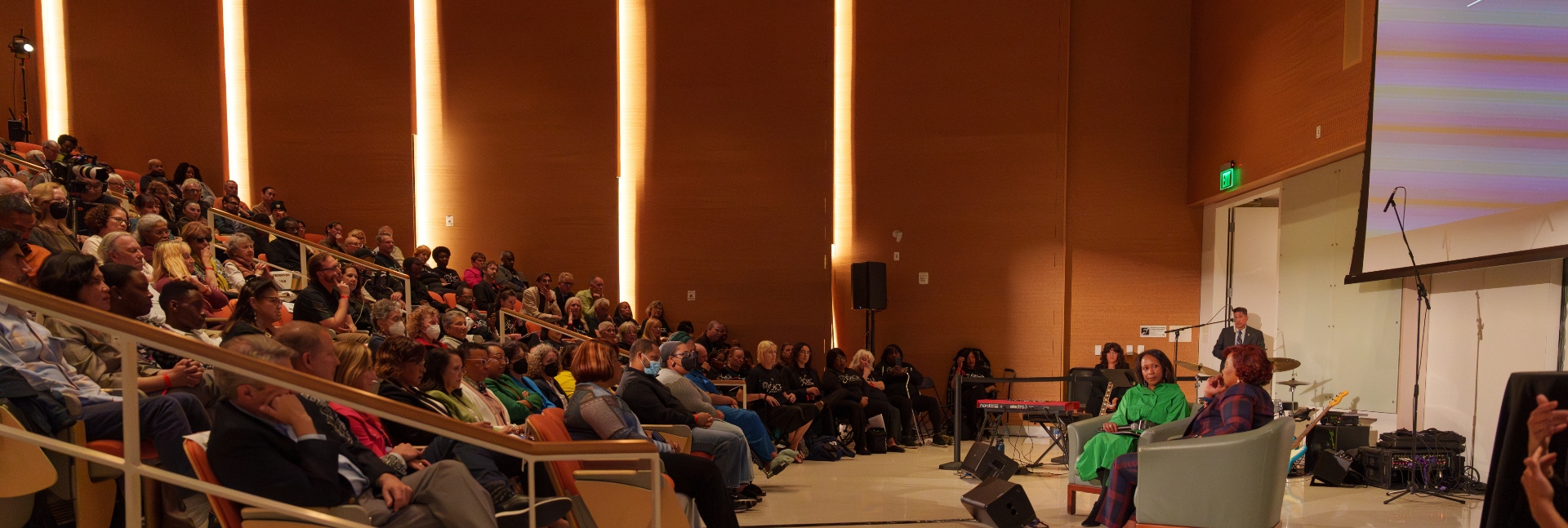
Dean Anderson’s insightful discussion with Dr. King revealed a number of personal stories about childhood in the King family, painting a picture of how Dr. King’s early life determined her destiny as the leader she's become.
Growing up with unconditional love and forgiveness, but impacted by unspeakable tragedy, Dr. King shared that she struggled to manage her emotions as a young person. Anger, frustration, loneliness, and an impulse to carve her own path impacted her journey. Learning to recognize her emotions, including her own biases and prejudices, was a key learning.
Some distinct lessons emerged from the conversation that illuminate Dr. King’s thoughts and feelings about the state of the world and the calls for change she and others are making today. These are best conveyed in her own words.
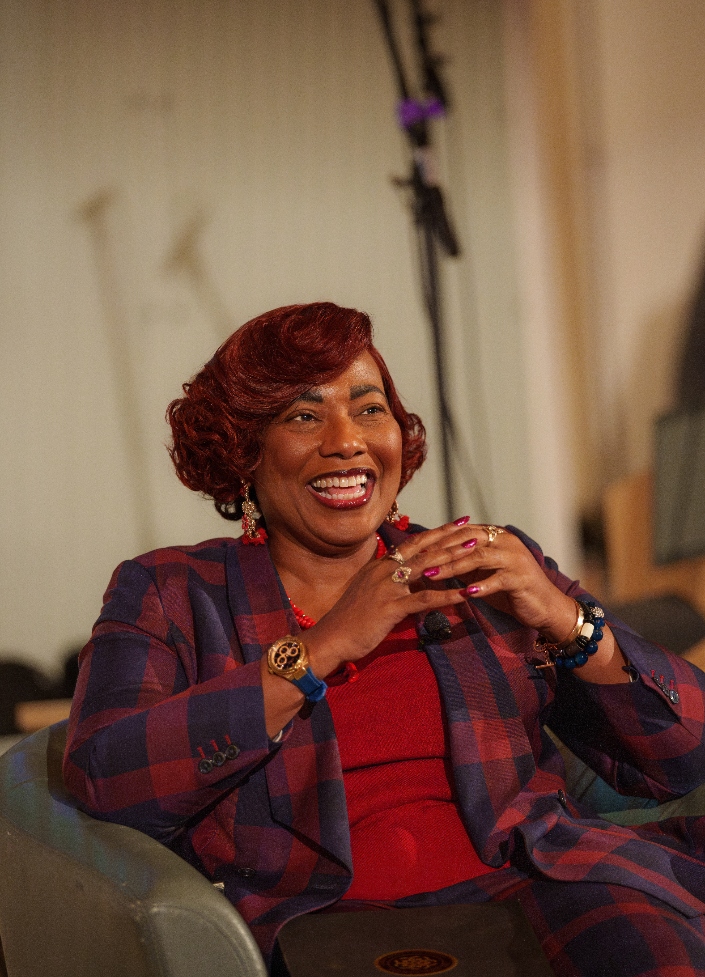
I have a dream lives on
We don’t say it like this today, but we should be: Martin King Jr. has not one of, but the most famous speeches in the world. People know that, you know, it's a famous speech, but think about it. If you go to Australia, if you go to Asia, China, even if you go to Africa, anyplace in the world…people are familiar with “I have a dream.” They may not know the entire speech, but they know good portions of it. I didn't know of any other speech in the world, that people know—in the suites to the streets!
So I'd say…it’s the most famous and the most inspiring and hope-filled speeches in the world. It has uplifted so many people around this world and given hope to so many generations of people who are living in conflict-torn regions, you know, people brought up growing up in oppressive regimes. It is just awe-inspiring for people.
Sacredness of personhood
The tragedy in today’s world is that too many people judge people by the book cover…a snippet of information that you may hear or read in mainstream media, you know, or the gossip you might hear from individuals or what you read on social media. And, there’s so much more to people and that’s what we’ve got to advance in our world in understanding there’s good in the worst of us and there’s bad in the best of us.
I heard that so often from my father and that’s how he was able to develop his novel philosophy methodology, because he understood the sacredness of the personhood of individuals, regardless of their story and their situation and their theological, their ideological beliefs and practices.
Practicing nonviolence
I always tell people that anger sits right here on my shoulder. And one of the main reasons that it does not control my life at this point is something that my mother said to me one day when I was traveling down the highway in Atlanta, I was so… I will say it this way: I was pissed off. And my voice was a little raised, and I was telling her what I was gonna do. She stopped me mid-sentence and said, ‘Baby, never make a decision in your anger.” And when I tell you, that has helped me. Do you know how many of us make decisions in a lot of different emotions that are not healthy, to make decisions out of–whether it's fear, anger, resentment, jealousy, envy? Do you know, if we just understood, what she said, how much– that little bit–how much better our world would be?
So, she wasn't saying don't feel it. That's natural. I have jealousies today. I have insecurities. I still have anger, but I'm learning….I can use it and channel it in other ways.
And that's what nonviolence does for people. And it's on the practical side. That's one of the reasons that my father stressed it and used it in the movement: because people were at the end of their rope in terms of the injustice system and the inhumanities that they were experiencing. And it was like, how do we channel this in a constructive way? And nonviolence enables you to do that. The problem is that most people don't understand it because they haven't studied it. Most people don't understand it and they haven't studied it, because they don't understand there's a way to study–that you can study it. It’s not nebulous and you're not left on your own. In fact, if we did what my father called for in 1964–when I say “we,” I mean the King Center. He said, in 1964, his Nobel Peace Prize lecture…he said, ‘I suggest that the philosophy and strategy of non-violence become immediate’--key word–‘a subject of study and serious experimentation’--subject of study and serious experimentation–‘in every field of human conflict…
When Martin King spoke and wrote, what he was saying to us in his words… It was critical for us to listen and to follow. And because we didn't, we’re in the shape we’re in! Because he gave us key instructions and guidance.
So we decided two years ago, in January to launch the first ever online, nonviolence–what we call 365. Because my father taught it as a lifestyle…something that we live day to day, in all of your encounters and engagements, with individuals, with society, with groups, with systems, with structures. And so we launched that available online at the King Center, and translated it into six languages. Because he was speaking to the world.
That's one of the reasons that my father stressed it [nonviolence] and used it in the movement: because people were at the end of their rope in terms of the injustice system and the inhumanities that they were experiencing. And it was like, how do we channel this in a constructive way? And nonviolence enables you to do that.
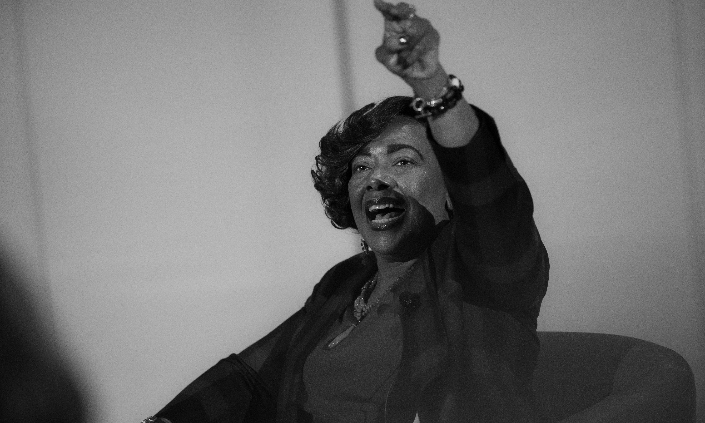
Applying your own voice to great assignments
My father was a very powerful, anointed, committed, dedicated, daring–everything you could think of–courageous, humble, obedient. Full of love and unconditional love… But, you know, he had an enormous assignment that put him in the way of harm constantly and, you know, some people loved him to death, other people loved and hated him, and other people just hated him. And, managing all of that, and really believing in humanity. I mean, if anybody was pulling for us, it was Martin Luther King Jr.---and I think where he is now he's still pulling for us--and so he suffered bouts of depression because of that.
So she [my mother, Coretta Scott King] was the one that had to keep him uplifted. And when I say she did it, she did it with a lot of grace, but she did it as a woman who had her own voice, her own ideas, her own thoughts. My mother was a peace activist before she met my father. She learned about Mahatma Gandhi in high school before my father intersected with the understanding of Gandhi… She was an activist very early on, so she didn't meet him as somebody that had to catch up. They were equals, you know, in terms of conversations and how they saw the world.
And so she was secure enough in her womanhood, to yield to his leadership because he had the greater assignment. And that's important to understand, too. You got to figure out when you connect with somebody, because sometimes people are literally on major assignments. And people have to decide is there a greater assignment here or not?
And so she knew when the movement started, that's something historic and something important and critical to future generations was happening.
Preserve the past to impact the future
And she [my mother, Coretta Scott King] started talking about a library documentation project for my father because she said, future generations are coming to study this movement…So that's what she did. She preserved.
And, so when he was assassinated—there had been a survey about two to three years saying he was one of the most hated persons in America. And I always tell people, he’s one of the most loved persons in the world now. He went from being one the most hated in America and graduated to one of the most loved in the world. People say, well that’s because he’s not here and, you know, he can’t intimidate anybody. That’s partly true. But the reality is, Coretta Scott King was the singularly devoted person day to day that pushed his legacy forward. She was very strategic in the way that she did it. She wanted to make sure there's an institution called the Martin Luther King Center for Nonviolent Social Change, which is the official, living memorial to the life, work and legacy of my father before there was a King holiday. Why? Because when you have holidays like this, people become intrigued. They want to know more. So you need an official place that can help to guide and define his whole legacy.
So she recognized, let me put this first before we put that out. Same as now, when people come to me about my mom and why there’s not more [information] on her, I said we got to first get her papers processed, digitized, and assess the inventory, because as soon as you do something major on her, guess what's going to happen? People start researching. And as my mother said, when you're studying people, especially if they're people with their primary source materials available, you don't want to study secondary effects. Go to the primary source. So we want to make sure the primary source materials of Coretta Scott King are available to the public before that happens. So we're in the process now, but you know, this: these are things that I learned from my mother. She was a phenomenal woman. And I tell people when you talk about Dr. King, you remember that. When you introduce me, Coretta Scott King is the reason why.
You can be exceptional in your life, but if there’s not a person devoted to carrying your work forward afterwards, you were just exceptional in your time.
You can be exceptional in your life, but if there’s not a person devoted to carrying your work forward afterwards, you were just exceptional in your time.
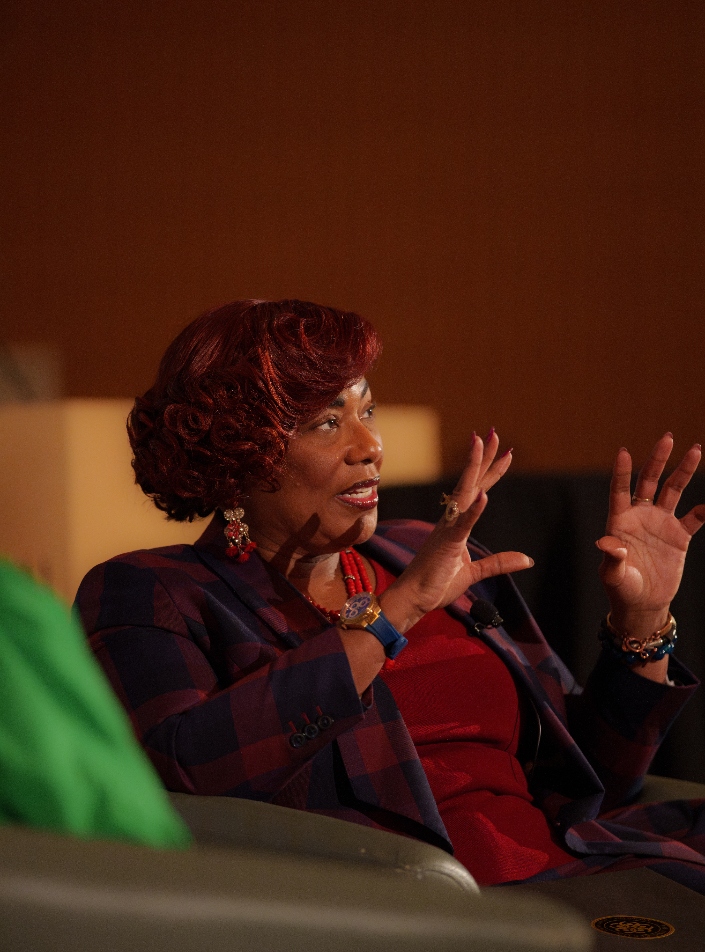
The campus climate
I think so often, we react to things in a moment and want to try to quiet down lessen the tension as quickly as possible. And that's what my father calls negative peace. Peace is not really the absence of tension; it's the presence of justice. And so you have to really back up and think about where we are in the world today.
There was a survey done by bestcolleges.com that says 70% of students are interested in social justice courses. That is not going to change in the near future because injustice is increasing and is out of control. And so how do you become powerful? And how do you become intentional and make it an institutional character that we begin to prepare socially conscious students? Because our world is going to require it. It's not going to change with just two or three people…There’s going to have to be that critical mass.
Technology and the peril of fools
We [are] all fascinated with AI, but are we being very thoughtful about you know what it is that we need to do as people as individuals, to ensure that AI doesn't overtake our humanity, you know, and create further injustices in our world? And that's what Dad warned us in 1967: “And Where Do We Go From Here: Chaos or Community?”—I recommend you get that book. He said he applauded the progress we've made technologically and scientifically. You know, he wouldn't have been able to fly…the skies the way he did and get to places as quickly as he did even during his time. But he also said, we have lulled, and we've made slow progress on our ethical and moral side.
So you got all these advancements, you know, with all these instruments and technology, but then human progression on ethical and moral is kind of slow. So there's this large chasm. He said, if we don't overcome that chasm, if we don't do something about it, we're going to destroy ourselves in the misuse of our own instruments. And AI is one of those things that we can very well end up destroying ourselves, because of who we are fundamentally today. The technology we're producing is coming out of who we are today. The same world you live in right now, with the deep polarization and divide and hatred and bitterness and injustice, which is transported into this whole technological world.
So something's got to change in us…as as we as we are wrestling with all of this.
So, you know, my challenge is: take some time and think about…the next 10 to 20 years, in terms of what you want to see in your world. If we want to create the beloved community, there's a process to doing that. There's some things we got to stop doing and there some things we got to start cultivating, you know, in our homes, in our schools, in our churches, faith communities. And we've got to be very intentional. Daddy [Martin Luther King Jr.] left us with a mandate: we must learn—key word—to live together as brothers— he didn't say sisters, but he meant that, too—or we will be forced to perish together as fools.
Hard questions, heart answers: seek first to understand
We need to be mature adults, have mature conversations, hard conversations, and start first without ‘I'm right, you wrong.’ Start with seeking. As Stephen Covey said in his book of “Highly Effective People,” decide what you want to be: effective, or ineffective. If you want to be ineffective, keep doing it that way. But if you want to be effective, seek first to understand, then to be understood.
Begin with the end in mind. What is it that you want as an outcome? Where is it that you really want to go: period. And realize, no matter who you disagree with, there's more of them. So we might as well figure out how to get along, how to create a society where we can forge pathways together in spite of our different thoughts, you know, but not compromising on injustice. And having conversations.
We’re trying to be God, in this time, when we are charged to be love. Your charge is to BE LOVE.
We’re trying to be God, in this time, when we are charged to be love. Your charge is to BE LOVE.
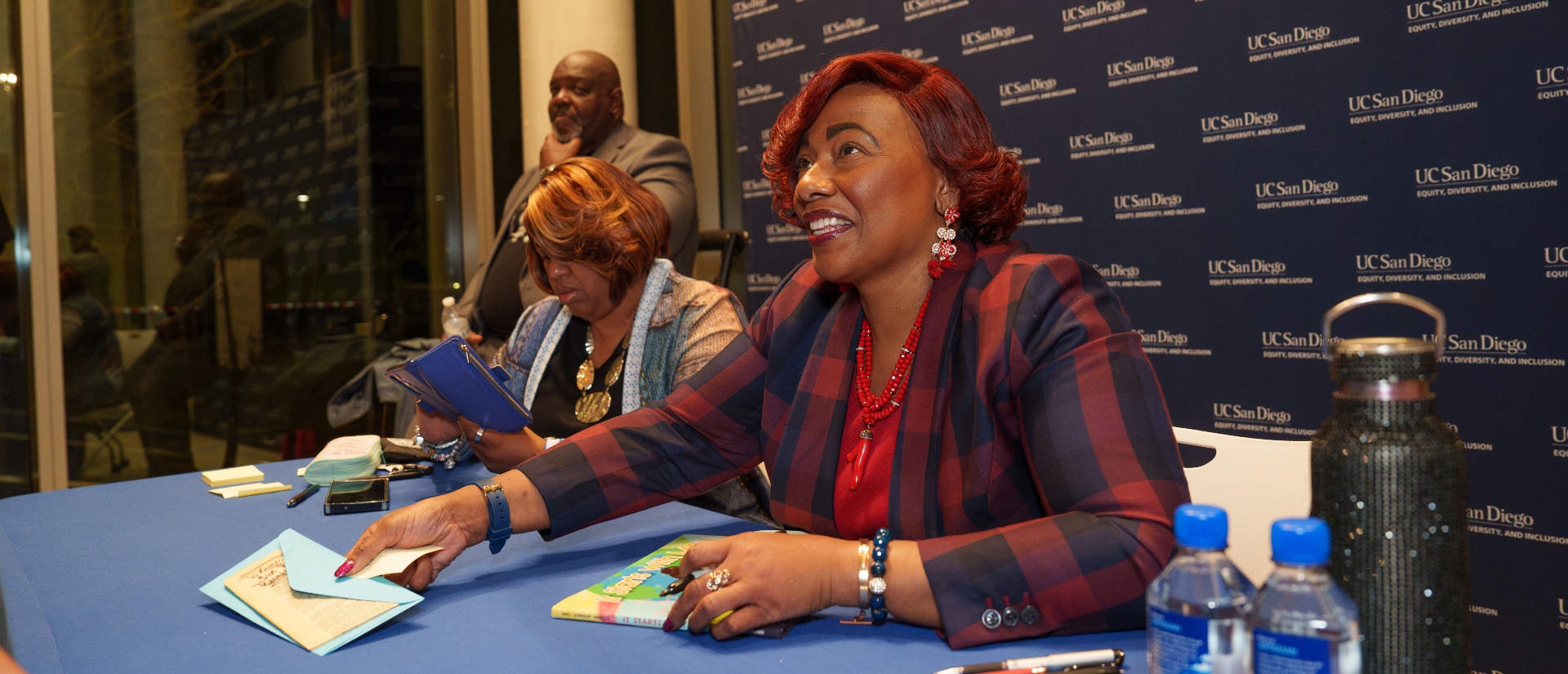
Voices of Our City Choir closed the program with another moving song that capped the moment with inspirational rhythms to match Dr. King’s uplifting messages.
The event concluded with a book signing and autograph session in the Jeannie foyer, providing attendees an opportunity to engage personally with Dr. King and leave with a cherished memento of the evening.
“We were honored to have Dr. Bernice King, a beacon of justice and equality, on our campus. The legacy of her family of resilience and advocacy inspires us all,” said Vice Chancellor Petitt. “In her lecture, she didn’t just share words, but gifted us a symphony of empowerment, stirring us to confront inequity with courage and compassion. We are encouraged to continue building a future where justice reigns supreme and dignity knows no bounds.”
The full broadcast of Dr. King: A Time for Change Now will be made available by UCSD-TV, accessible on the Helen Edison Lecture Series website
Share This:
You May Also Like
Stay in the Know
Keep up with all the latest from UC San Diego. Subscribe to the newsletter today.

